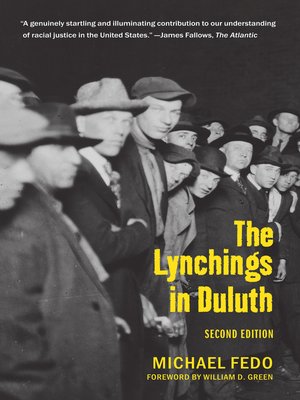
Sign up to save your library
With an OverDrive account, you can save your favorite libraries for at-a-glance information about availability. Find out more about OverDrive accounts.
Find this title in Libby, the library reading app by OverDrive.



Search for a digital library with this title
Title found at these libraries:
| Library Name | Distance |
|---|---|
| Loading... |
On the evening of June 15, 1920, in Duluth, Minnesota, three young black men, accused of the rape of a white woman, were pulled from their jail cells and lynched by a mob numbering in the thousands. Yet for years the incident was nearly forgotten. This updated, second edition of The Lynchings in Duluth includes a new preface by the author, additional research and notes, and suggestions for further reading.
"This account of racial violence in the early twentieth century is a genuinely startling and illuminating contribution to our understanding of racial justice in the United States in the twenty-first. Many Americans have found it convenient to think that episodes like this come only from the Jim Crow–era Deep South. The Lynchings in Duluth is a powerful reminder of the broader American pattern." —James Fallows, The Atlantic
?"A chilling reconstruction of a 1920 racial tragedy. . . . Combining hour-by-hour, day-by-day narrative with expert scholarship based on interviews, suppressed documents and news reports, Fedo skillfully portrays Northern prejudice and violence." —Los Angeles Times
?"This tense book punches out a story of devastating fury. . . . As pointed as a Klansman's cap, this book conveys the horror of mob action—and the disturbing truth that it knows no region." —Milwaukee Journal
"This account of racial violence in the early twentieth century is a genuinely startling and illuminating contribution to our understanding of racial justice in the United States in the twenty-first. Many Americans have found it convenient to think that episodes like this come only from the Jim Crow–era Deep South. The Lynchings in Duluth is a powerful reminder of the broader American pattern." —James Fallows, The Atlantic
?"A chilling reconstruction of a 1920 racial tragedy. . . . Combining hour-by-hour, day-by-day narrative with expert scholarship based on interviews, suppressed documents and news reports, Fedo skillfully portrays Northern prejudice and violence." —Los Angeles Times
?"This tense book punches out a story of devastating fury. . . . As pointed as a Klansman's cap, this book conveys the horror of mob action—and the disturbing truth that it knows no region." —Milwaukee Journal







